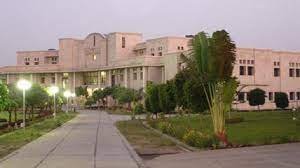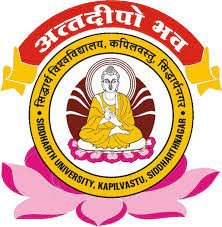Future Scope: Master of Arts in Sanskrit
The pursuit of a Master of Arts (MA) in Sanskrit not only provides a deep understanding of this ancient and revered language but also opens up a world of opportunities in various fields. Sanskrit, often considered the root of many modern Indian languages, holds immense significance in literature, philosophy, culture, and heritage. In this comprehensive we will explore the future scope and benefits of an MA in Sanskrit, shedding light on the diverse career paths and personal enrichment that this academic journey can offer. Graduates can engage in academia, education, research, translation, and a variety of fields that value their expertise in Sanskrit. Beyond career prospects, the study of Sanskrit provides cultural enrichment, linguistic proficiency, critical thinking skills, and a deep connection to India's rich heritage. Whether one's interest lies in academia, cultural preservation, or exploring the spiritual and philosophical aspects of Sanskrit, an MA in Sanskrit can be a profoundly rewarding and intellectually fulfilling journey.
1. Academic and Research Opportunities:
One of the most natural career paths for graduates with an MA in Sanskrit is to further their academic pursuits. Many choose to pursue a Ph.D. in Sanskrit or related fields, allowing them to engage in advanced research, publish scholarly works, and contribute to the academic community. Academic positions as professors, researchers, and scholars are often open to those with a strong background in Sanskrit.
2. Teaching and Education:
MA in Sanskrit graduates can find fulfilling careers as educators. They can become Sanskrit teachers at schools, colleges, or universities, imparting their knowledge of the language and its rich literary heritage to the next generation. Teaching not only offers a chance to share one's passion but also provides job stability and opportunities for personal growth.
3. Translation and Interpretation:
Sanskrit is a language that has contributed significantly to the world's intellectual heritage. Graduates proficient in Sanskrit can work as translators, translating classical Sanskrit texts into various languages. This is not only a valuable service but also a way to make these ancient texts accessible to a global audience.
4. Archaeology and Epigraphy:
Sanskrit plays a crucial role in deciphering inscriptions and texts found in archaeological sites and historical monuments across India and beyond. Graduates with expertise in Sanskrit can work in the field of archaeology and epigraphy, helping unravel the secrets of the past and preserving cultural heritage.
5. Content Creation and Journalism:
With the growth of digital media and content consumption, there is a demand for experts in Sanskrit to create content related to Indian culture, philosophy, and heritage. This includes writing articles, scripts, and producing multimedia content. Some also pursue a career in journalism with a focus on covering cultural and linguistic topics.
6. Administration and Civil Services:
An MA in Sanskrit can be advantageous for those aspiring to enter civil services, as it demonstrates a strong foundation in language, culture, and history. It can be particularly beneficial in roles related to heritage preservation, cultural affairs, and administration.
7. Library and Museum Curatorship:
Libraries and museums often require experts who can curate collections related to Sanskrit literature and culture. Graduates with an MA in Sanskrit can find opportunities to manage and curate these valuable resources.
8. Yoga and Philosophy:
Sanskrit is the language of many ancient yogic texts, including the Yoga Sutras of Patanjali. Those interested in yoga philosophy and practice can benefit from a deep understanding of Sanskrit, which allows for a more profound exploration of these texts and teachings. They can become yoga instructors, philosophers, or spiritual guides.
9. Publication and Editing:
Graduates with a strong command of Sanskrit can work in the publishing industry, particularly in the editing and proofreading of texts related to Sanskrit literature and philosophy. They can ensure the accuracy and authenticity of publications.
10. Cultural Events and Tourism:
Sanskrit scholars are often sought after to conduct cultural events, lectures, and guided tours related to Indian heritage and culture. This provides an opportunity to interact with diverse audiences and promote cultural understanding.
Benefits of an MA in Sanskrit
Pursuing a Master of Arts (MA) in Sanskrit offers a plethora of career opportunities and personal benefits. Graduates can engage in academia, education, research, translation, and a variety of fields that value their expertise in Sanskrit. Beyond career prospects, the study of Sanskrit provides cultural enrichment, linguistic proficiency, critical thinking skills, and a deep connection to India's rich heritage. Whether one's interest lies in academia, cultural preservation, or exploring the spiritual and philosophical aspects of Sanskrit, an MA in Sanskrit can be a profoundly rewarding and intellectually fulfilling journey.Apart from the diverse career opportunities, pursuing an MA in Sanskrit offers several personal and intellectual benefits:
1. Cultural Enrichment:
Studying Sanskrit deepens one's connection to India's cultural heritage. It allows students to explore classical texts, epics, poetry, and scriptures, providing insights into the rich tapestry of Indian culture.
2. Linguistic Proficiency:
Sanskrit is known for its precise grammar and structure. Learning Sanskrit enhances linguistic skills and can make learning other languages, especially Indian languages, more accessible.
3. Critical Thinking and Analysis:
The study of Sanskrit involves critical analysis of ancient texts. Graduates develop strong analytical skills that can be applied in various fields, including problem-solving and decision-making.
4. Global Perspective:
Sanskrit is not limited to India; it has influenced and continues to influence global thought. Graduates gain a broader perspective on the interconnectedness of cultures and civilizations.
5. Personal Fulfillment:
For many, the study of Sanskrit is a lifelong passion. It provides a sense of personal fulfillment and intellectual satisfaction, allowing individuals to delve deep into timeless wisdom and knowledge.
6. Contribution to Preservation:
Graduates play a vital role in preserving and propagating the knowledge contained in Sanskrit texts, ensuring that future generations can benefit from this cultural treasure.
 2 Years
2 Years
 Post Graduate
Post Graduate
 Arts
Arts














 back
back

